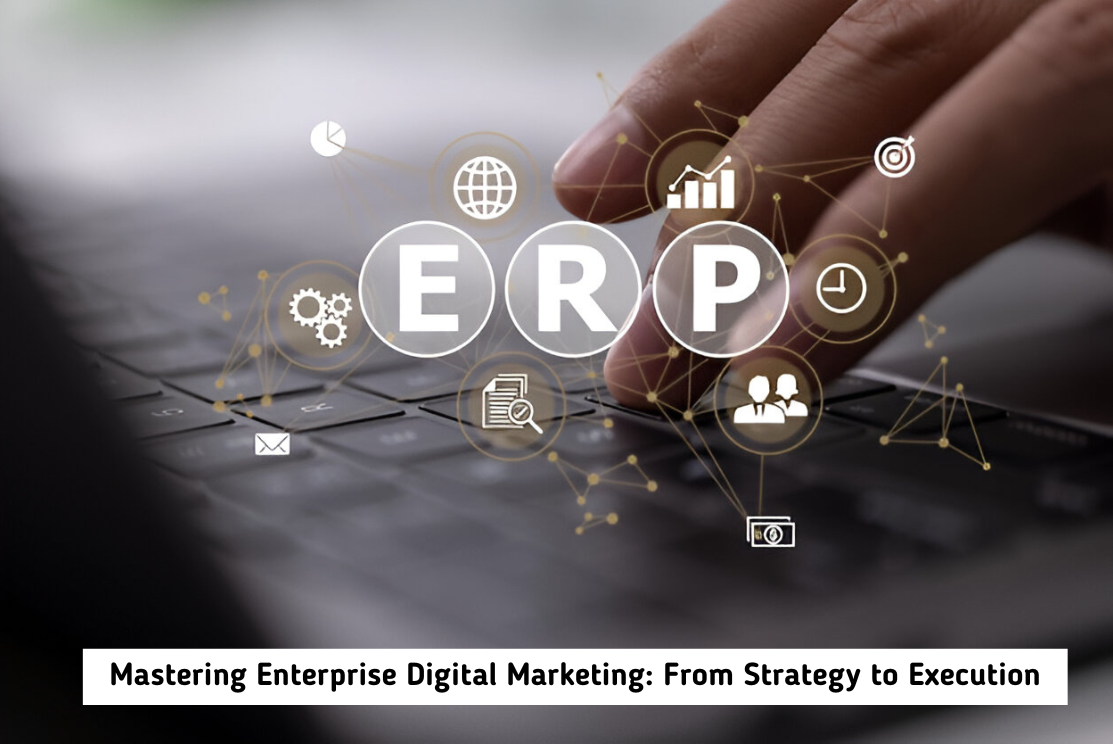Enterprise digital marketing, often known as e-enterprise or EDM, is a strategy for conducting business online via a variety of platforms, including social media, websites, and search engines. It entails using technology to connect with potential clients and establish a solid rapport with them. Through this kind of marketing, businesses can learn a great deal about the behavior of their customers, which they can then utilize to better target their advertising campaigns and choose which product lines to offer. Maximizing revenue while preserving client loyalty across several platforms is the aim. A comprehensive strategy for online marketing, enterprise digital marketing emphasizes the utilization of resources and technology to improve customer reach.
In particular, it includes social media campaigns, email campaigns, mobile strategies, website design and development, SEO, and conversion rate optimization (CRO). These methods can be combined to create an integrated strategy that meets the objectives of a company and yields a quantifiable return on investment.
What Are the Benefits of Enterprise Digital Marketing?
Digital marketing for businesses has many advantages. By using this digital strategy, businesses may make the most of their current clientele by establishing enduring connections through targeted marketing on social media platforms like Facebook or Twitter or content-rich emails. Learn about consumer behavior trends as well to see where your audiences hang out. Use CRO strategies specifically designed for enterprise websites to boost income; use enterprise SEO best practices to maintain your competitive edge.
To sum up the benefits of enterprise digital marketing strategies:
- Better reach: With enterprise digital marketing, businesses can reach a larger and more assorted audience than with conventional marketing methods.
- Augmented targeting: Digital marketing enterprise allows businesses to focus on specific audience segments with personalized messaging and content. This results in enhanced engagement and conversion rates.
- Cost-effective: Compared to conventional marketing methods, enterprise digital marketing is often more cost-effective, allowing enterprises to achieve more remarkable results with smaller budgets.
- Better analytics: Enterprise digital marketing provides businesses with detailed analytics and metrics that can be used to measure the potency of campaigns and make data-driven decisions.
- Enhanced brand awareness: By leveraging digital channels, businesses can enhance brand awareness and strengthen their reputation through targeted messaging, content, and advertising.
How Does Enterprise Digital Marketing Work?

Enterprise digital marketing relies on a solid foundation that focuses heavily on data analysis and creative content strategies. These are tailored specifically for different target markets or demographics specified by each company’s unique objectives when beginning such a campaign for it to yield maximum results.
The basic premise behind any successful enterprise digital marketing campaign revolves around three key steps:
- Planning and research
- Implementation and execution
- Analysis and optimization
1. Planning and research
In order to determine what kinds of channels could work best for reaching target audiences, the initial step entails comprehending the business objectives and looking at targeting market segmentation data.
2. Implementation and execution
Tactical implementation is the next step, when innovative concepts are generated based on prior market research, tested, and then scaled up based on performance data obtained from test runs over a predetermined amount of time.
3. Analysis and optimization
The last stage entails ongoing analysis to help companies evaluate overall success/failure rates and identify areas that need improvement if intended results do not materialize within the allocated parameters for any number of reasons, such as financial limitations, etc.
What Makes Digital Marketing Different for Enterprise Companies?
Using strategies like email, social media, SEO, content marketing, video advertising, and mobile applications, enterprise digital marketing is an online marketing strategy. It is a method of promoting goods or services by establishing a connection with potential clients via digital platforms. Unlike typical marketing campaigns, this kind of marketing is used by corporations or huge enterprises and calls for specialized skill sets.
Digital marketing for enterprise companies differs from that for small businesses or startups in several ways:
1. Scale
The budget is a crucial factor to take into account. Compared to smaller organizations, enterprise companies may have far larger budgets and resources. As a result, they are able to start and oversee more intricate and comprehensive digital marketing efforts.
2. Intricacy
Enterprise businesses frequently have a wide range of customers and a number of brands, goods, and services, which might complicate their digital marketing plans.
3. Information administration
Large volumes of data are generated and gathered by enterprise businesses as a result of their digital marketing activities; in order to properly analyze and utilize the data, advanced data management technologies and expertise are needed.
4. The incorporation process
Enterprise businesses frequently have to integrate their digital marketing strategies with other departments including product development, sales, and customer support as well as their overall business plans.
Using Targeted Channels to Unlock the Potential of Enterprise Digital Marketing

The environment of enterprise digital marketing is always expanding, and there has never been more demand to reach enterprise clients efficiently. Businesses can unleash the potential of digital marketing with the correct approach and focused distribution channels.
However, here are some channels that are generally effective for enterprise digital marketing:
1. Search Engine Optimization (SEO)
To improve your website’s visibility on search engines and increase website traffic, enterprise SEO is essential. This entails creating high-quality backlinks and optimizing the content and architecture of your website. The quality of the content, the relevancy of the keywords, the structure of the website, the user experience, and the site’s overall authority and trustworthiness are some of the elements that might impact a website’s search engine rankings.
Both on-page and off-page optimization tactics, such as social media marketing, link development, content optimization, and keyword research, are included in SEO procedures.
2. Content Marketing
The goal of content marketing is to draw in and keep your target audience interested by producing interesting and engaging content. Whitepapers, movies, infographics, blog entries, and other kinds of information can all fall under this category. Instead of overtly advertising a product or service, content marketing seeks to add value for the audience by producing content that informs, amuses, or motivates them.
Businesses may gain credibility and position themselves as experts in their field by offering valuable material, which will eventually boost sales, customer loyalty, and brand awareness.
3. Social Media Marketing
Social networking sites like Facebook, LinkedIn, Instagram, and Twitter may be very effective tools for connecting and interacting with your target audience. Social media may be used to promote your goods and services, increase website traffic, and establish your brand.
Businesses may engage with customers in real time, reach a wide range of people, and get feedback and insights into their wants and preferences by using social media platforms.
Hence, it is an essential aspect of enterprise digital marketing. If you want to scale your business, hire a digital marketing agency with a demonstrated track record of success and experience in your industry.

